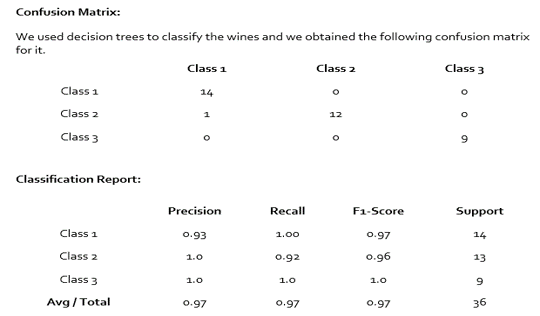The Problem Statement
Staying true to its mission of delivering quality wine to customers, the client wanted to ensure the testing of wine must pass through multiple set of chemical parameters. To measure the quality of wine, the client approached KritiKal to develop Machine Learning (ML) based algorithms to determine the origin/class of wines using chemical analysis. The predictive model would have the capability to make data analysis based on certain chemical parameters, identify patterns and dictate the wine quality without human intervention.
Screenshots

The Solution
Having a proven track record of offering the best-in-class services and solutions in ML/AI, Data Science & Analytics to extract intelligence and insights from data, KritiKal mobilized a team of highly experienced software developers to create ML algorithms to decide the class of wine. We had to predict the quality of wine based on some parameters which client use to measure the quality of the wine. The parameters were collected on the basis of chemical reactions of the wine with certain chemicals. Some of these parameters were:
- Alcohol
- Malic acid
- Magnesium
- Total phenols
- Flavonoids
- Non-Flavonoid phenols
- Proanthocyanidins
- Color intensity
- Hue
- Proline
To identify the wine on the basis of these parameters, the wine was separated into 3 categories (containers). Data collection was done manually using some chemical tests done on it. These values were collected manually and entered in the system by using the csv format. For this, we developed an ML-based technique to classify these containers. Using ML algorithms, we trained the model to be able to classify the wine with containers with 97% accuracy. KritiKal classified the type of wine in the container using the following values.
Total 178 samples were collected, and they were distributed as follows;
Class 1 : 59
Class 2 : 71
Class 3 : 48
All these samples had 13 feature vectors and for training the model we had to normalize them on a scale of 0 to 1.
Benefits Delivered
Using the wine quality data set, the client was able to generate insights on factors that play a vital role in determining the quality of wine. The Machine Learning based regression modelling of data analysis simplified the wine quality assessment process by examining the associated chemical properties.
Technology Used
- Predictive Modeling
- Machine Learning



